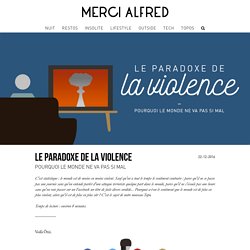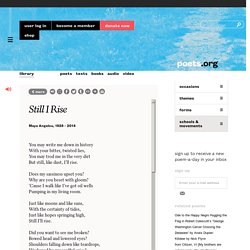

Lucile
RC1 La contribution des pouvoirs publics à la justice sociale. Vocabulaire. The short history of global living conditions and why it matters that we know it - Our World In Data. This is the introduction to Our World in Data – the web publication that shows how global living conditions are changing.

This text was previously titled "A history of global living conditions in 5 charts". A recent survey asked “All things considered, do you think the world is getting better or worse, or neither getting better nor worse?”. In Sweden 10% thought things are getting better, in the US they were only 6%, and in Germany only 4%. Very few people think that the world is getting better. What is the evidence that we need to consider when answering this question? I. To see where we are coming from we must go far back in time. 30 or even 50 years are not enough. Take a longer perspective and it becomes very clear that the world is not static at all. To avoid portraying the world in a static way – the North always much richer than the South – we have to start 200 years ago before the time when living conditions really changed dramatically. II. III. IV. V. VI. VII. VIII. Le Paradoxe de la violence.
C'est statistique : le monde est de moins en moins violent.

Sauf qu'on a tout le temps le sentiment contraire : parce qu'il ne se passe pas une journée sans qu'on entende parler d'une attaque terroriste quelque part dans le monde, parce qu'il ne s'écoule pas une heure sans qu'on voie passer sur un Facebook un titre de faits divers sordide... Pourquoi a-t-on le sentiment que le monde est de plus en plus violent, alors qu'il est de plus en plus sûr ? C'est le sujet de notre nouveau Topo. Temps de lecture : environ 8 minutes. ----------------- Voilà Ötzi. Son portrait robot ? Bref, pas exactement ce qu’on avait entendu dans nos cours de philo, où on nous parlait souvent du mythe du bon sauvage : l’idée que l’homme, naturellement bon, serait corrompu par la civilisation et deviendrait hyper violent et mal intentionné uniquement à partir du moment où il vivrait en société, entouré d'autres êtres humains. Là, on vous propose un petit exercice. Ça n'a rien à voir avec les extra-terrestres... Attaquée par Finkielkraut, Schiappa lui répond vertement.
Attaquée par Finkielkraut, Schiappa lui répond vertement Trnqnt llgrmnt n ncn bllt d Mrlèn Schpp, nvll scrtr d’tt chrg d l’glt ntr ls fmms t ls hmms, pps l stgmtstn ds mèrs vls ccmpgnnt ls nfnts drnt ls srts sclrs, ln Fnklkrt s’st lâch l 21 m sr ls nds d RCJ, fc l très cmprhnsv lsbth Lvy, d mgzn Csr.

L’ntllctl mdtq, lsnt pnblmnt ss nts, ccs l’l lcl d Mns (Srth) d vlr fvrsr l prsnc d vl l’cl nm d l l d 1905. t d s fndr d’n rqstr frml cntr n tr pstn d Mrlèn Schpp, q s’n srt prs «vc n vlnc nï sxsm, l msgyn d l rlgn cthlq t ccssrmnt d l rlgn jv, ls Lbvtchs, n l’ccrrnc, sns n mt, vdmmnt, sr l’slm». Ss-ntnd pn vl q l scrtr d’tt srt vscrlmnt nfd x crnts slmqs, vr slmsts.
Dns n crrr q s’st prcr Lbrtn, Mrlèn Schpp rpnd ttr prsnnl (mêm s l crrr st n-têt d sn nv mnstèr) phlsph. «Ql hnnr vs m fts !» Still I Rise - Poems. Read poems by maya angelou Maya Angelou was born Marguerite Johnson in St.

Louis, Missouri, on April 4, 1928. She grew up in St. Louis and Stamps, Arkansas. She was an author, poet, historian, songwriter, playwright, dancer, stage and screen producer, director, performer, singer, and civil rights activist. Among her volumes of poetry are A Brave and Startling Truth (Random House, 1995); The Complete Collected Poems of Maya Angelou (Random House, 1994); Wouldn’t Take Nothing for My Journey Now (Random House, 1993); I Shall Not Be Moved (Random House, 1990); Shaker, Why Don’t You Sing?
In 1959, at the request of Dr.
Politique étrangère. Économie. Être un·e allié·e. Etudes/Ecole. Histoire. Prendre soin de soi. Travail. Santé physique et mentale. Etat d'urgence. Matériaux pour cerveau. France. Médias. Classisme. Psycho. Les usages de l'image : photographie. LGBTQ. Musique. Racisme. Féminisme. Random. Réflexions sur des objets culturels.